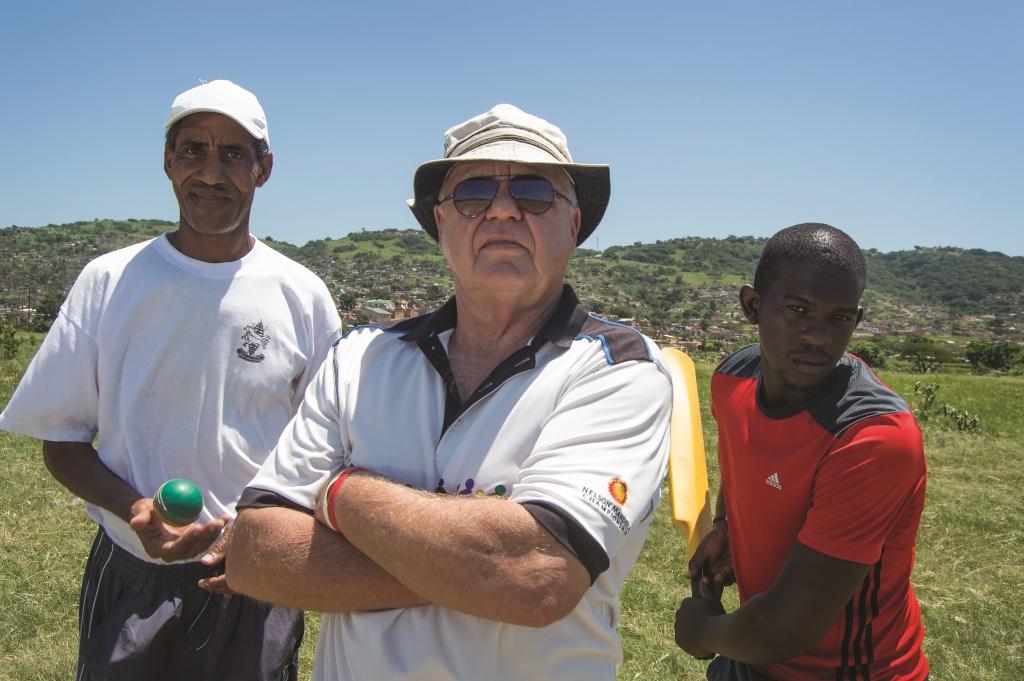As a towering, grey-haired, ex-cricketer gets out of his sedan at Ottawa Primary School, the tiny girls in brown tunics and boys in white shirts and grey pants, race towards him chanting: “coach! coach! coach!” High fives all round. Joy fills the swarm of youngsters and the old man smiles.
This is the reception for cricketing legend Mike Procter at this school in Phoenix, an Indian suburb north-west of Durban. The Ottawa children are from a poverty-stricken township called Zwelitsha (the new world in Zulu), on the bushy hillside of the settlement. Procter drives 20 kilometers, from the swimming pools and sprinklers of Durban north, to coach at the school. He has done this for the past four years, four days a week and three hours a day.
It is 10AM and break-time. The school serves around 1,100 children their first meal of the day, probably the last of the day for many. They gobbled down their rice and mashed potatoes with one eye on the cricket pitch; the Grade Fives rush to the rough field outside the school for the first practice session. There are so many that hour-long sessions are held for each grade. Procter works with two coaches: Rodney Malamba and Rocky Mgobhozi; taking charge of children aged between five and 16.

“We had one girl who picked up a bat for the first time and hit the ball on the off side. Mostly, kids just swipe at it, but she played almost a proper cricket shot. Rodney and I looked at each other. The hairs on our necks stood up,” says Procter.
When Procter came to the school, he built bowling nets but the sessions grew so popular. There were too many children for nets. They are disused with long grass growing around. On the football field, oblivious of the frustrations of the coaches, the boys and girls raced up and down the field and Mgobhozi knocks catches. He seemed happy with the improvement and eagerness.
Three weeks into the beginning of the first school term in January, Procter laments how the school had to go on teaching despite the failure of the government to deliver the quarterly food supply. The Mike Procter Foundation fed the children for two weeks. There was also help from England cricket fans touring South Africa for the test series. They gave £2,000 ($2,800) from their own pockets but this will last no more than six months.
“The foundation is here to help with everything; it is not really about cricket but the development of a child. Once you have been with them you do realize that they are in need… We took 16 of these children to the South Africa and Australia test match at Kingsmead – something they have never experienced before,” says Procter, the South Africa’s former coach and selector.
The life Procter lived is a world away from the children he is trying to help. He went to the best schools and matriculated at Hilton College, a private boys’ boarding school in Durban.
“I had all the opportunities, I had everything I could ask for when I was their age. But they have absolutely nothing. Some of them have only one meal a day,” says Procter.
Malamba, a former Natal Cricket Union (now KZN Dolphins) fast bowler and Procter’s friend, brought him to the school in 2012. They coached together at Natal, where Malamba retired as a first-class cricketer in the 1980s. The Cape Town-born Malamba played club cricket in England. Since his return in 1987, Malamba, whose father, Ben, played professional cricket in the fifties, has been running his academy in Durban.
In his playing days, Procter was the sought after star all-rounder and devastating wicket taker who started his career with Natal in the early 1960s. Through apartheid, his international career was cut off in its prime as South Africa was isolated from world sport. He played seven tests for his country, against Australia, between 1967 and 1970. Aged 23, Procter went to play in England for Gloucestershire in county cricket for 13 years – supporters used to call the county Proctershire.
When South Africa was readmitted to international cricket, in 1991, Procter was appointed the national team coach, and then an International Cricket Council match referee. In 2009, Procter lost his job as the chairman of selectors of the Proteas, but started the foundation to introduce the sport to poor communities in Durban.
A business friend approached Procter with idea to adopt a school, to train cricketers, and promised to fund the project. He agreed and reached out to Malamba to recommend a school. Ottawa was identified and a first group of children started. But the businessman disappeared, leaving Procter disappointed and bereft.
“I broke the news to Rodney. He told me if we back off with the project, we will be breaking hearts of many children. Rodney said exactly what I was thinking. I was not prepared to abandon the children. The seed was already planted,” says Procter.
We caught up with the 50-year-old Malamba on the makeshift football field outside the school premises. A decade ago, Malamba saw the children walking to school and a few were run down by cars on to their way.

“Life is like a house. You don’t build it from top to bottom, you begin with a formidable foundation. These kids here are not what they used to be when they first came to school, cricket has changed their attitude to life; they may not end up being cricketers but something in life. That’s how sport changes people’s lives,” says Malamba.
At the end of the last session, Malamba kneels down to pack the bats and wickets in his bag; young cricketers circle him, with some playing imaginary cricket shots in the air. Malamba is well aware; it takes time and patience to polish these diamonds. He sees his young, eager self in them and wants them to have the chance to change their lives.
